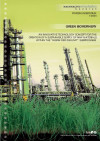Suchergebnisse für "Factsheet: Energietechnologien gestalten, die für alle sinnvoll und nutzbar sind"
PH Office - Criterions for energy-efficient office buildings
The passive house standard and energy-efficient building technologies are getting increasingly important for office buildings, too. However, standardisation is not completed on the same level as known from the residential building sector. The project at hand brings in definitions and makes a suggestion on a standardised calculation method for office buildings in passive house quality.
Sustainable Business Planner
Further development of the established management concept business plan to the Sustainable Business Plan. Production, testing and dissemination of the holistic user-oriented IT Tool "Sustainable Business Planner" in the context of an Austrian start-up initiative.
Green Biorefinery

An innovative Technology Concept for the Creation of a Sustainable Supply of Raw Materials within the "Fabrik der Zukunft" Subprogram
Forschungsforum
1/2004
Herausgeber: BMVIT
Englisch, 6 Seiten
Downloads zur Publikation
Sustainability Reporting - Guidelines for Sustainability Reporting based on reporting processes of VA Technologie and Österreichische Bundesforste
Scientific attendance of sustainability reporting processes in two partner enterprises (VA Tech and ÖBf AG). Development of the guideline "Reporting about Sustainability" based on these practical experiences.
Integration of renewable energy sources for district heating in cities
Portfolio of technologies and action plan for the integration of renewable energy sources for district heating in cities and for enhancing the total efficiency of the supply chain from energy input to energy service.
The Sahel Project
Silicate technology for the improvement of water uptake and nutrient storage in marginal soils; field tests in the northern Sahel region in Senegal
Development of a Cost-Benefit-Tool: costs and benefits of energy efficient and ecologic buildings
Development of a cost-benefit-tool which reaches beyond a pure cost approach and also recognizes the benefits of a building for its inhabitants and users. The inclusion of benefits is based on existing evaluation systems, especially on the Austrian building evaluation system TQB - Total Quality Building, which has been revised in 2009.
Energy-self-sufficient district Güssing
Development of a concept that shows the possibility of changing the energy supply of a district from fossil to 100% renewable energy carrier
Architectural Concept for Musicians
Starting from the special needs of a specific user group, an Architectural Concept for Musicians will be proposed and realized, with Housing as principal functional usage.
Criteria catalogue for quality assurance in the construction of passive houses built in wood
By means of a criteria catalogue possible sources of error in the construction of passive houses built in wood will be identified both craft specific and concerning the installation of house automation facilities. Solutions will be acquired, a controlling tool for construction sites will be offered.
Energetic building refurbishment in protection zones

Standardized solutions as a help and guideline for building-owners, authorities and companies
Facilitated decision-making procedures for sustainable refurbishment of residential properties

Participation in the refurbishment process: Monitoring of concrete refurbishment projects and development of guidelines to optimise the planning, information and decision-making processes in the course of the refurbishment of residential properties
Total Quality Design and Assessment of buildings as a strategy to increase the level of know-how with regard to the issue of "sustainable buildings".

Total Quality Design and Assessment is an instrument to increase the demand for high quality buildings; "high quality" in terms of improved comfort as well as decrease in negative environmental impact, at affordable costs. Application of TQ design targets requires additional and new knowledge, thus increasing the level of know-how with regard to the issue of "sustainable buildings".
Assessment of user requirements and technical feasibility of lightweight applications based on renewables
Assessment of user requirements was studied. Furthermore, the technical feasibility of se-lected lightweight applications based on renewables in the furniture and interior design sector is investigated through involvement of all relevant stakeholders (panel manufacturers - further processing enterprises - distributors - consumers) in the value chain.
"eco fashion - fashion for the future" - Congress about ecological and social impacts of textile production
The project was intended to promote a change of image related to ecotextiles. A congress provided teachers and education experts with background information and tools for their work, thus leading to a sustainable transfer of knowledge in education.
"1000 Passivehouses in Austria" - Passive house object databank

The first joint project of the four IG passive house organisations on behalf of the programme line "Building of Tomorrow" - an initiative of the Federal Ministry for Transport, Innovation and Technology - for the purpose of setting up a detailed network documentation of 80% of all passive houses in Austria.
Homeservices by the company of tomorrow
Sustainable services in co-operation with the housing sector will be investigated, their effects on environment, employment, acceptance by consumers, hindrances as well as prerequisites for sustainable facility management and a new positioning of concierge systems analysed.
Architecturally Diverse, Energetic Renewal

Post War Modernist Buildings Under Monument Protection. A Comparative Analysis of Energy Efficient Renewal Case study: Open Air School Franklinstrasse, Wien 21
The Passive House in Practice

Strategies to open markets for passive houses in the east of Austria
FABRIKregio - Development, test and spreading of models for the self-evaluation of sustainability at enterprise level under special consideration of regional successful factors
The project provides enterprises with a new self-evaluation model, which serves the purpose to support sustainable decisions. Focal point and innovation are: more active participation of the employees and better consideration of regional economic factors for success.
